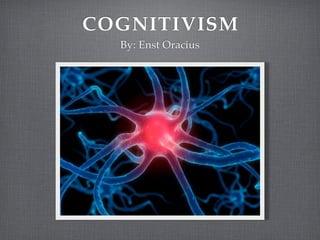Oracius theory
•Als KEY, PDF herunterladen•
1 gefällt mir•324 views
cognitivism
Melden
Teilen
Melden
Teilen

Empfohlen
Weitere ähnliche Inhalte
Was ist angesagt?
Was ist angesagt? (19)
Strategies for developing creativity and critical thinking 

Strategies for developing creativity and critical thinking
Ähnlich wie Oracius theory
Ähnlich wie Oracius theory (20)
16.2 Priority 1 Practice Intentional TeachingIntentional te.docx

16.2 Priority 1 Practice Intentional TeachingIntentional te.docx
Kürzlich hochgeladen
This presentation was provided by William Mattingly of the Smithsonian Institution, during the fourth segment of the NISO training series "AI & Prompt Design." Session Four: Structured Data and Assistants, was held on April 25, 2024.Mattingly "AI & Prompt Design: Structured Data, Assistants, & RAG"

Mattingly "AI & Prompt Design: Structured Data, Assistants, & RAG"National Information Standards Organization (NISO)
APM Welcome
Tuesday 30 April 2024
APM North West Network Conference, Synergies Across Sectors
Presented by:
Professor Adam Boddison OBE, Chief Executive Officer, APM
Conference overview:
https://www.apm.org.uk/community/apm-north-west-branch-conference/
Content description:
APM welcome from CEO
The main conference objective was to promote the Project Management profession with interaction between project practitioners, APM Corporate members, current project management students, academia and all who have an interest in projects.APM Welcome, APM North West Network Conference, Synergies Across Sectors

APM Welcome, APM North West Network Conference, Synergies Across SectorsAssociation for Project Management
Kürzlich hochgeladen (20)
Mattingly "AI & Prompt Design: Structured Data, Assistants, & RAG"

Mattingly "AI & Prompt Design: Structured Data, Assistants, & RAG"
Seal of Good Local Governance (SGLG) 2024Final.pptx

Seal of Good Local Governance (SGLG) 2024Final.pptx
APM Welcome, APM North West Network Conference, Synergies Across Sectors

APM Welcome, APM North West Network Conference, Synergies Across Sectors
ICT Role in 21st Century Education & its Challenges.pptx

ICT Role in 21st Century Education & its Challenges.pptx
Measures of Central Tendency: Mean, Median and Mode

Measures of Central Tendency: Mean, Median and Mode
Oracius theory
- 1. COGNITIVISM By: Enst Oracius
- 2. COGNITIVISM (MENU) What? Who? How? My Classroom
- 3. WHAT IS COGNITIVISM? Cognitivism was officially recognized around 1956. In science, cognition refers to mental processes. These processes include attention, remembering, producing and understanding language, solving problems, and making decisions. Cognitivist replaced behaviorism in 1960s as the dominant paradigm.
- 4. WHAT IS COGNITIVISM? Video Cognitivism is the study in psychology that focuses on mental processes, including how people perceive, think, remember, learn, solve problems, and direct their attention to one stimulus rather than another. Cognitive theory, activities like thinking and remembering seem like a behavior, thus providing an avenue to use behavior analysis to measure their effect on learning.
- 5. KEY FIGURES Alan Paivio (1925- Robert Gagne (1916-2002) Howard Gardner (1943-) Benjamin Bloom (1913-1999)
- 6. ROBERT GAGNE He was born in 1916-2002 He was a psychologist and educator Mr. Gagne developed his learning theories based on behaviorist's and information processing point of view. He is know for his contribution in the area of cognitive learning hierarchies Mr. Gagne also identified five major categories of learning: verbal information, intellectual skills, cognitive strategies, motor skills, and attitudes. While in the Air Force, he develop some of his ideas for his comprehensive learning theory.
- 7. ROBERT GAGNE • Gagne developed three principles that he viewed as integral for successful instruction: 1. Providing instruction on the set of component tasks that build toward a final task 2. Ensuring that each component task is mastered 3. Sequencing the component tasks to ensure optimal transfer to the final task • To maximize the potential for the internal process of learning to occur, Gagne identified nine events of instruction.
- 8. HOW WILL WE OBSERVE THIS? Teachers By allowing children to interact with one another By placing within their grasp block and slot games Also this can be captured by putting different toys out We can analyze the children when they draw or write
- 9. HOW WILL WE OBSERVE THIS? Children They would play matching games They would be given task based off of instructions The students would do normal everyday assignments
- 10. MY CLASSROOM This theory would help with the different groups It would determine the different stations of activities Which level each kid would be on It will shape how I instruct the children based on their learning perspective It will help with how the children are tested
- 11. MY CLASSROOM I would utilize Gagne five areas of learning outcomes I would also use his nine events of instruction
Hinweis der Redaktion
- \n
- \n
- \n
- \n
- \n
- \n
- \n
- \n
- \n
- \n
- \n